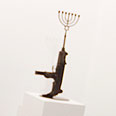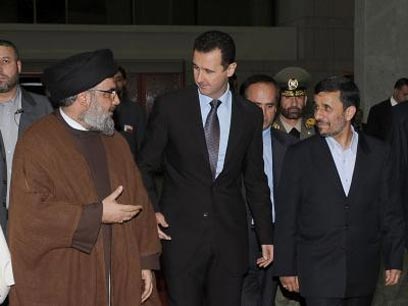In recent years, a number of erroneous notions have been re-injected into the policy discourse on the thirty-year old alliance between Syria and Iran. Statements such as "prying Syria away from Iran," or "flipping Syria," or "ending Syria's marriage of convenience with Iran" have quickly become stock phrases in policy circles, both in the U.S. and Israel. This position fundamentally misrepresents the nature of the Syria-Iran alliance and recycles a flawed argument that is almost as old as the alliance itself.
Resurging Rhetoric
While running for president in August 2007, now-Vice President Joe Biden told the Jerusalem Post that while Syria was "Iran's closest ally," the U.S. "should work to break up its marriage of convenience with Iran."
Similarly, in 2008, Anthony Lake, a senior advisor to then-Senator Barack Obama, told the New York Sun that one advantage of engaging Syria was "in part to break its unnatural alliance with Iran."
This line of reasoning was also embraced by a number of Republican stalwarts. Former Secretary of State James Baker, for example, has been advocating the "marriage of convenience" position for years. In a December 2006 television interview with CNN's Larry King, the former Secretary of State explained that Syria sought to "come back" to "the United States and moderate Arab nations."
The following year, as the head of the Iraq Study Group, Baker testified before the Senate Foreign Relations Committee on January 30, 2007, that the U.S. had a "tremendous opportunity here to perhaps move them away from a marriage of convenience with Iran..."
More recently, Baker appeared on CNN in September 2008 and asserted that the U.S. "could flip Syria away from Iran." In January 2009, he told Newsweek that in return for the Golan Heights and normalized relations with Washington, "we might wean them from Iran."
Brent Scowcroft, another veteran Republican, contended in January 2007 that "Syria cannot be comfortable clutched solely in the embrace of Iran, and thus prying it away may be possible."
The Old Is New Again
Apart from the substantive dubiousness of these arguments, they are neither new nor original. What might appear new is that some portray Syria's strong and intimate relationship with Iran as a result of misguided policies from the George W. Bush administration. The two rogue states, according to this line of thinking, were drawn together because they were both isolated. Syria, it is argued, had no choice but to embrace Iran to avoid isolation.
These arguments, however, date as far back as 25 years, just after the alliance between the Assad regime and the Islamic Republic was first formed. In 1983, the Washington Post reported that the Syria-Iran alliance was "unnatural."
The term "alliance of convenience," however, was first applied in the pages of Middle East Insight by scholar Shireen Hunter in 1985. As the alliance endured beyond the Iran-Iraq war (1980-1988) and Operation Desert Storm (1991), in an essay titled "Syria and Iran: From Hostility to Limited Alliance," Hunter labeled the alliance as "limited" and "uneasy," adding that it was "troubled" and "strained" due to "underlying incompatibilities in their respective interests and aspirations."
The Dividers
Analysts provide several reasons for their claim that Syria and Iran are unnaturally matched. The argument usually revolves around the following two categories:
Ideology: The official regime ideologies?Syrian Pan-Arab nationalism/Baathism and Iranian Khomeini-style Islamic Revolution?are said to be incompatible since the first is seen as secular while the latter is theocratic. It is then deduced that the alliance between the two must be transient, particularly because the ideologies of the two regimes are deemed to be at odds.
Religion and Ethnicity: Iran is a pre-dominantly Persian and Shiite regime, while Syria is a majority Sunni Arab country, even if ruled by a minority Alawite clique. These divides are deemed too deep to allow for more than a temporary, tactical convergence. Herein lies the origin of the theory that Syria will return to the "Sunni Arab fold." (Ironically, the Alawites are often categorized as a "Shiite offshoot," which was used by some to explain Syria's affinity with the Iranians and the Shiites of Lebanon, particularly Hezbollah.)
The Uniters
Given these alleged differences, analysts then posit that two factors have drawn Syria and Iran illogically together.
Economy: Since these two regimes had little in common ideologically, ethnically, and religiously, the reasoning went, shared economic hardships (i.e. Western sanctions) drew them closer out of necessity. The New York Times touted this argument in 2007, arguing that Syria, paralyzed by the Bush administration's isolation policies, had no other options than to turn to Iran; the Bush administration had unwittingly drawn the two "unnatural" allies closer together.
Reaction To Regional Threats: It is further argued that Iran and Syria are ultimately drawn together in a realist, defensive pact against common aggressive regional foes, namely Saddam Hussein's Iraq (before the 2003 invasion) and Israel (backed by the U.S.). However, now that the Iraqi threat has waned, one pillar of this alliance is gone. Thus, according to this logic, if Israel returns the Golan Heights and signs a peace treaty with Syria, the raison d'etre of the alliance will disappear. In other words, whenever external threats and isolation ease, so too will Syrian-Iranian ties. The premise here is that the Syrian-Iranian alliance is reactive.
Proactive, Not Reactive
The above arguments, however, ultimately fail to explain the endurance of the 30-year old alliance between Tehran and Damascus.
Scholars Nimrod Raphaeli and Bianca Gersten persuasively argue that the alliance is not driven by economic considerations. While there has been a great deal of excitement generated over car manufacturing plants, oil refineries, and other projects totaling more than "$10 billion over the next five years," the numbers simply don't add up. True, Iran supplied Syria with oil during the Iran-Iraq war, and has financed Syrian military programs in more recent years. But the economic relationship cannot be seen as the lynchpin of Syria-Iran ties. This is especially so, now that oil prices have plummeted.
Similarly, the religious-sectarian issue must also be rejected. As far back as 1983, Syrian officials declared Islam to be the common bond between Damascus and Tehran, transcending the Arab-Persian divide. As scholar Martin Kramer noted in Shi'ism, Resistance and Revolution, the Iranian-born Lebanese Shiite cleric Musa Sadr offered the Assad regime religious legitimacy through a 1973 fatwa declaring Alawites to be Twelver Shiites. Sadr paved the way not just to a longstanding relationship between the Assad regime and the Lebanese Shiite Amal movement (founded by Sadr), but also acted as liaison between Assad and Khomeini's aides before the 1979 Islamic Revolution in Iran.
Today, Syrian officials, including Bashar al-Assad, routinely talk about Arabism and Islam as twin pillars of strength. The product of this amalgam can be seen in the discourse of Hezbollah, which is sponsored both by Damascus and Tehran. Hezbollah reinforces this ideological marriage by marketing its brand of "resistance" to the broader Sunni Arab world via al-Manar television and other sophisticated public relations outlets. The group's narrative of "resistance" is today the common ideological banner of the Syrian-Iranian axis.
Thus, "ideology" should not be narrowly defined in describing the underpinnings of this axis. As author Jubin Goodarzi notes in Syria and Iran: Diplomatic Alliance and Power Politics in the Middle East, it is precisely because the two regimes have different ideologies that their alliance has endured. Moreover, Goodarzi notes that the political elite in both countries have important shared perceptions, and that their secular and fundamentalist ideologies overlap in certain respects:
An examination of how the bilateral ties between Syria and Iran evolved... reveals the flawed conclusions of those who argued that the alliance was a marriage of convenience, a short-term tactical link between two regimes with disparate ideologies and objectives. It also exposes the limits of the realist school of thought in explaining the behaviour of these two states. If immediate security concerns and material interest had been the driving forces in their foreign policies, particularly in Syria's case, the relationship would have collapsed. However, both parties had broader, long-term strategic concerns derived from their national security priorities and based on their respective ideologies and world views. They saw a unique role for themselves in the region and utility in preserving the alliance to pursue an independent foreign policy to shape events in the Middle East?
Syria traditionally views itself as inhabiting the center of the Arab order, and has long vied for the leadership position of the Levant, which it considers its rightful patrimony. In order to do so, it must undercut and neutralize rival Arab states. Only Iran affords it the ability to do so. Indeed, given Syria's weakness, its natural weight would not allow it to actualize this lofty goal. It would be relegated to a marginal regional position, which would have severe implications for the legitimacy of the regime.
Far from being reactive, the Syria-Iran alliance seeks to overturn the balance of power in the region. As such, both states have an interest in undermining Arab states like Egypt and Saudi Arabia, as well as other U.S. allies and interests in the region.
Ultimately, Iran offers Syria the ability to pursue its agenda, which is often done through blackmail and violence, and through the support of terrorist non-state actors such as Hamas and Hezbollah. Indeed, the alliance with Iran, Hezbollah, and Hamas allows Syria to manipulate Palestinian politics (and even project itself into Jordan), while undercutting Egypt and rendering itself a veto-wielding usurper of the Egyptian role.
Goodarzi sums up this approach: "Hafez Assad, Ruhollah Komeini and their successors have viewed the region as a strategic whole and regarded their alliance as a vital tool with which to further Arab-Islamic interests and increase regional autonomy by diminishing foreign penetration of the Middle East. As a result, to advance their common agenda over the years, both countries have put long-term interests before short-term gains."
If the goal is to project leadership and subvert and fundamentally reshape the regional architecture, then not only is the alliance not "reactive," but the converging interests, shared assets, and common objectives dictate that any notion of driving a wedge between Iran and Syria is hopelessly facile and off target.
Policy Options
Advocates of the "flip Syria" argument articulate no basis for their theories, offering instead empty rhetoric and inconsistent assessments. For instance, the International Crisis Group in 2006 stated that mere peace negotiations between Israel and Syria would "alter the regional atmosphere," and a peace deal would "fundamentally alter? [Syria's] relationship with Iran." Such claims have repeatedly been dispelled by events. Indeed, while Syria and Israel negotiated for a full decade in the 1990s, Syria maintained, consolidated, and enhanced its alliance with Iran.
This has led the advocates of this theory to tone down their assertions to state that engaging Damascus would not "flip Syria," but rather, in the words of Aaron David Miller, lead to a long-term process of "weaning the Syrians? gradually" from Iran, while showering Damascus with "economic and political support." These shifts in positions only confirm that the "flip" policy requires tangible U.S. and Israeli concessions in return for little more than wishful thinking.
In the end, the Syrian-Iranian relationship has not changed much over three decades. Consider Goodarzi's assessment of the relationship in 1986:
Why Assad refused to distance himself from Iran and join mainstream Arab politics to minimize the risk of conflict with Israel and the West baffled many observers, for he would have derived considerable benefits, including oil and financial rewards, from the pro-Iraqi camp. Indeed, the USSR, Saudi Arabia and Jordan put considerable pressure on Syria to sever its links with Iran and mend fences with Iraq. Such a move could have eased its security dilemma with Israel, improved its regional and international standing and ensured a flow of economic and financial aid to remedy its dire domestic economic situation.
Syria's alliance with Iran continues to baffle observers. Yet, its position tells much about its priorities, interests, and objectives?if Washington is willing to listen.
Tony Badran is a research fellow for the Foundation for Defense of Democracies and the author of beirut2bayside.blogspot.com.
Alexander Münch said...

Pastorius said...
Alexander Münch said...
Pasto, I just received the link to this piece from someone on my Class of ‘71 Listserv. She presents herself to everyone as a lover of peace, but she apparently is drawn to some of the worst war-mongering propaganda around. I don’t have time to tackle this right now. I welcome your comments both on the film itself (and its two authors Joe Mowrey, scriptwriter, and Anthony Lawson), and the way in which such a piece of work can appeal to people who think they are in the peace camp.
I just received the link to this piece from someone on my Class of ‘71 Listserv. She presents herself to everyone as a lover of peace, but she apparently is drawn to some of the worst war-mongering propaganda around. I don’t have time to tackle this right now. I welcome your comments both on the film itself (and its two authors Joe Mowrey, scriptwriter, and Anthony Lawson), and the way in which such a piece of work can appeal to people who think they are in the peace camp.




 I
I  Los Angeles Times/Bloomberg,
Los Angeles Times/Bloomberg, 




 A display by a Spanish artist, including a candelabrum growing out of the barrel of an Uzi sub-machinegun and a sculpture of a haredi figure standing on a priest, who kneels on a prostrate Muslim, has drawn fire from the Foreign Ministry. The Israeli Embassy in Madrid issued a statement Wednesday protesting the display at the International Art Fair in the Spanish capital.
A display by a Spanish artist, including a candelabrum growing out of the barrel of an Uzi sub-machinegun and a sculpture of a haredi figure standing on a priest, who kneels on a prostrate Muslim, has drawn fire from the Foreign Ministry. The Israeli Embassy in Madrid issued a statement Wednesday protesting the display at the International Art Fair in the Spanish capital.




 ..Israeli Shekel Exchange
..Israeli Shekel Exchange